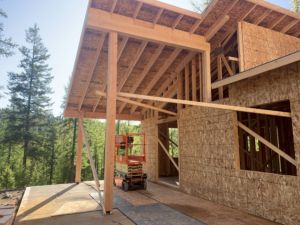Options for purchasing land
If you want to purchase land, one of the first questions you might ask is, what are my options to buy land? Can I get a loan? Do I have to pay cash? Do I need to apply for a regular mortgage? How can I make it mine?
This post provides some insight into options for purchasing land.
First, your financing choices may be different whether you are purchasing land without any plans to build, or whether you are purchasing land and expect to add a home in the near future. Starting with the first option:
Purchasing land only
If your long term plan is to buy land now and then perhaps build in five or more years OR if you are buying acreage for another purpose such as hunting, camping, gardening or exploring, you are purchasing land only.
Options for buying land only are:
Cash
Purchasing land with cash is most agreeable to the seller and is usually the easiest for the buyer. Your cash offer will be strong, you can purchase the land quickly and your overall costs will be less since you aren’t paying any bank fees. The only negative to using cash is you no longer have it on hand. If you need to keep some funds to do any kind of land improvements or to purchase equipment, you’ll just need to ensure you are looking at appropriately priced land.
Purchasing with cash means the seller will get cash from you. But that cash could be obtained in various ways.
Actual cash: If you have a bank account with enough funds in it, then this would be the fastest option. Just be prepared to send it over!
 Borrow against your 401(k): You might be able to borrow up to $50K from your 401(k) account, and then pay the principal and interest back through automatic payroll withdrawals. Basically, you’re using your own retirement money and paying yourself back. You’ll usually need to repay the money within a five year timeframe and you don’t typically need to provide your credit scores. But check with your 401(k) plan administrator for specific details that relate to your specific account. Some may not allow borrowing for any reason.
Borrow against your 401(k): You might be able to borrow up to $50K from your 401(k) account, and then pay the principal and interest back through automatic payroll withdrawals. Basically, you’re using your own retirement money and paying yourself back. You’ll usually need to repay the money within a five year timeframe and you don’t typically need to provide your credit scores. But check with your 401(k) plan administrator for specific details that relate to your specific account. Some may not allow borrowing for any reason.
Home Equity Line of Credit: A HELOC is a line of credit the bank agrees to provide you with your current home as collateral. If your bank will allow you to use equity in your home to purchase land, then this is certainly an option. Basically, you’ll be given a revolving line of credit that you can use for large expenses. As you pay it off, the part you paid off is again available for your use. For example, if your line of credit is $100,000 and you purchase an $80,000 parcel of land, you’re left with $20,000 you can use to purchase something else. When you pay back some of the $80,000, whatever you pay back gets added to the $20,000 so you have more left to make another purchase. New tractor anyone? HELOCs often have a lower interest rate than other types of loans, and you might be able to deduct the interest at tax time.
Home Equity Loan: This is very similar to the HELOC, but in this case you will get a lump sum up front, and as you pay it off, the amount owed decreases. The amount you can get is usually a percentage of the equity you have in your home (appraised home value less amount of first mortgage). As with a HELOC, your home is put up as collateral.
Gift: You may have family, friends, or others that will be giving you money to help you with your dream. That’s a great thing. Nothing more to be said here.
Owner Financing: Another option for purchasing land only could be through owner financing, if the seller is willing to consider this (many are not). Basically, you would provide an agreed-upon down payment, and then make installment payments over a specific time with a specific interest rate until the loan is paid. The loan from the seller is secured by the land being sold, so if you default on payments, the property would be foreclosed or repossessed, same as it would be with a normal loan. The time frame for repayment is often much less than with a typical mortgage (for example, five years instead of the “normal” 15 or 30).
Loan: There may be some loan options available to you for purchasing land-only, but it will not be a typical mortgage product. For example, you may be able to use a personal loan or credit union loan.
- Personal loans typically do not require providing collateral, unlike home equity loans. You will have to have good credit, steady income, and low debts compared to your income. Interest rates may be higher than other options, and money may need to be paid back in a shorter time frame. The other thing to know is the amount that can be borrowed may be lower than the amount you need.
- Credit unions might also provide funding to be used to purchase land. You may need to provide a 10-20 percent down payment. In addition, the potential use of the land, and the loan to value information may determine the amount you can borrow, or whether you can. And finally, you may need to already be or may need to become a member of the credit union in order to use this option.
Bottom line, if you are purchasing land only, there are various options you may be able to use.
Purchasing land and building a home
Purchasing land and building a home provides other options. In addition to the options above of using cash, a home equity loan or line of credit, a personal or credit union loan, you also have the option of a construction loan/mortgage.
Home construction loans
 Home construction loans are short-term loans that are used to enable land to be purchased and a home to be built. They are usually a year or so in duration. Once the home is built, the balance becomes a mortgage. That’s the simple explanation!
Home construction loans are short-term loans that are used to enable land to be purchased and a home to be built. They are usually a year or so in duration. Once the home is built, the balance becomes a mortgage. That’s the simple explanation!
Construction loans may have higher interest rates than traditional mortgages, since there is no home to be used as collateral. That makes construction loans somewhat riskier to the lender.
The bank making the loan will need to know the scope of your building project. Typically, once the loan is approved, the builder starts work on your dream home. They will then send a request for payment to the bank on a regular basis, say, monthly. The bank will send an appraiser out to make sure the billed work has been completed, and if so, funds will be released to the builder. At the end of the build, the entire amount of funds provided to the builder will be owed by you. Please note, it is likely a bank making a construction loan will not do so if the borrower and builder are the same person, unless the borrower is a licensed builder by trade.